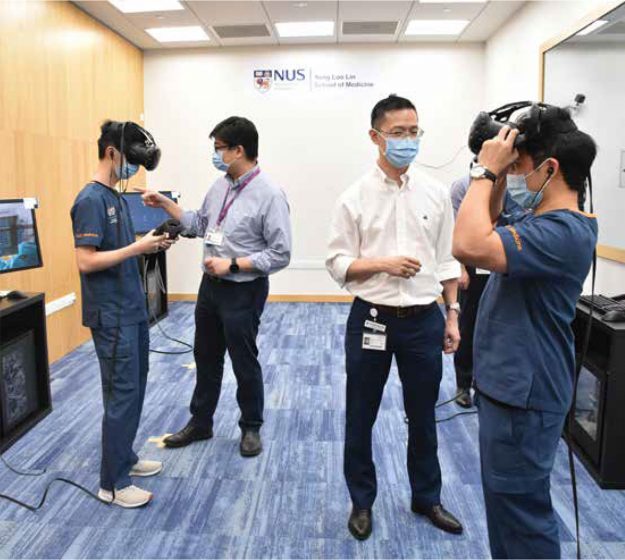Learning Virtually about Patient Safety, Safely
Amidst the COVID-19 pandemic, medical educators face the challenge of balancing practical learning experiences while ensuring the safety of students by minimising the latter’s exposure to contagion. However, this also presents opportunities for current technological tools and developments to plug the gap in training methods in medical education.
Educators at NUS Medicine have created an innovative system to help medical students acquire understanding of patient safety and inter-professional communications in complex, hard-to-simulate surgical settings—through virtual reality (VR) gaming.
Known as the PAtient Safety aS Inter-Professional Training (PASS-IT), this digital gaming system enables students to experience a simulated world in the peri-operative setting: from dental clearance to anaesthesia evaluation, to the handling of sharps during surgery and the safe conduct of operations. Donning VR headsets and wielding handheld controllers, students are immersed in the operating theatre scenario as they interact with each other in real time and learn the processes germane to patient safety.
Associate Professor Alfred Kow, a surgeon and Assistant Dean (Education) of NUS Medicine and one of the educators spearheading the initiative, shared, “This tool can also allow students to make mistakes, learn in a safe environment and ensure that they are competent before they enter the actual clinical environment to care for patients.”
With the start of Phase 2 of Singapore’s reopening, the PASS-IT programme was piloted with a cohort of 36 third-year medical students who had just completed their clinical rotations in surgery and a group of 56 fourth-year medical students during their Anaesthesia posting.
“This tool allows students to make mistakes, learn in a safe environment and ensure that they are competent before they enter the actual clinical environment to care for patients.”
— Assoc Prof Alfred Kow, Assistant Dean (Education), NUS Medicine
The results were encouraging, with students showing improved understanding of peri-operative patient safety after the training. The VR training has also elevated their appreciation of effective communication among healthcare workers. In addition, the majority of students positively rated the use of VR technology in enhancing their knowledge of patient safety.

A/Prof Terry Pan (second from left) and Assoc Prof Alfred Kow (third from left), guiding students with the PASS-IT simulation.
Third-year medical student Eleanor Loh shared that PASS-IT helps bring her closer to what actually happens in the operating theatre, compared to watching videos or reading textbooks. It also enhances her understanding of the procedures involved in surgery. She reflected, “We don’t know the flow of how surgery works—from the moment the patient walks into the waiting room—because now we only get to see them post-op. By then they are already all sutured up. So getting to understand the flow—checking dental carries, the process of anaesthesia, all the checking processes—I think that is something that really sticks and helps us to form associations.”
With the COVID-19 restrictions in place, Nicole-Ann Lim, another third-year medical student, felt that not being allowed to enter surgical settings reduces students’ exposure by half compared to pre-COVID-19 times. “We don’t get to see spatially how different healthcare staff interact during a surgical setting. So learning through PASS-IT makes the difference; with this we get to see what we are missing with the restrictions,” she shared.
With a total of 12 VR stations, each comprising a 15-minute game with various medical scenarios, learners have to “perform” standard operating procedures, including checking for patients’ consent, verifying their identities, and correctly handling surgical tools. Their physical movements and actions are also tracked and displayed in real time on a screen, for visualisation and evaluation. Students are also required to attend a debrief session after the game, to discuss their learning and feedback.
Through this gamification tool, multiple learners are immersed in situations where they are given the opportunity to participate in what would usually be a highly restricted environment, especially as they have been removed from settings of practical learning to avoid exposure to aerosol-generating procedures.
“Medical students have not been allowed into the operating theatre during their Anaesthesia posting as a result of the COVID-19 situation.
“We don’t get to see spatially how different healthcare staff interact during a surgical setting. So learning through PASS-IT makes the difference; with this we get to see what we are missing with the restrictions.”
— Nicole-Ann Lim, Phase III medical student
The introduction of PASS-IT VR system has been timely as it gave the students a unique opportunity to continue the operating theatre learning experience virtually in a safe and structured manner. This innovative VR tool can certainly complement the operating theatre learning experience when the current restrictions are lifted,” added Assistant Professor Terry Pan from the Department of Anaesthesia at NUS Medicine.
